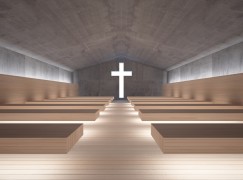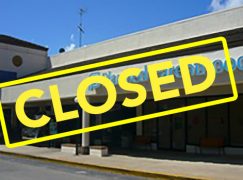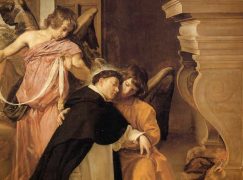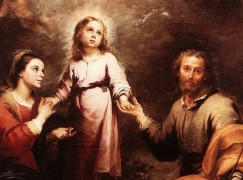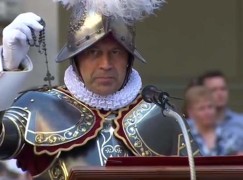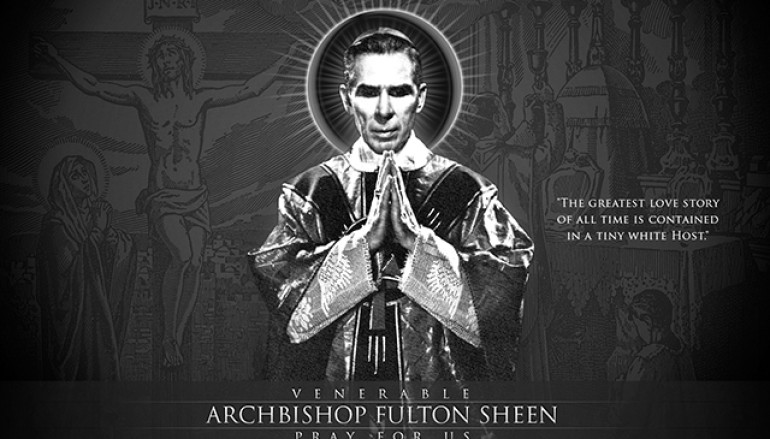

Archbishop Fulton Sheen: Make the Hour
“You will have to fight many battles, but do not worry because in the end you will win the war before the Blessed Sacrament.”
RESOLVED TO MAKE THE HOLY HOUR
On the day of my Ordination, I made two resolutions:
1. I would offer the Holy Eucharist every Saturday in honor of the Blessed Mother to solicit her protection on my priesthood. The Epistle to the Hebrews bids the priest offer sacrifices not only for others, but also for himself, since his sins are greater because of the dignity of the office.
2. I resolved also to spend a continuous Holy Hour every day in the presence of our Lord in the Blessed Sacrament.
In the course of my priesthood I have kept both of these resolutions. The Holy Hour had its origin in a practice I developed a year before I was ordained. The big chapel in St. Paul’s Seminary would be locked by six o’clock; there were still private chapels available for private devotions and evening prayers. This particular evening during recreation, I walked up and down outside the closed major chapel for almost an hour. The thought struck me – why not make a Holy Hour of adoration in the presence of the Blessed Sacrament? The next day I began, and the practice is now well over sixty years old.
Briefly, here are some reasons why I have kept up this practice, and why I have encouraged it in others:
First, the Holy Hour is not a devotion; it is a sharing in the work of redemption. Our Blessed Lord used the words “hour” and “day” in two totally different connotations in the Gospel of John. “Day” belongs to God; the “hour” belongs to evil. Seven times in the Gospel of John, the word “hour” is used, and in each instance it refers to the demonic, and to the moments when Christ is no longer in the Father’s Hands, but in the hands of men. In the Garden, our Lord contrasted two “hours” – one was the evil hour “this is your hour” – with which Judas could turn out the lights of the world. In contrast, our Lord asked: “Could you not watch one hour with Me?”. In other words, he asked for an hour of reparation to combat the hour of evil; an hour of victimal union with the Cross to overcome the anti-love of sin.
Secondly, the only time Our Lord asked the Apostles for anything was the night he went into his agony. Then he did not ask all of them … perhaps because he knew he could not count on their fidelity. But at least he expected three to be faithful to him: Peter, James and John. As often in the history of the Church since that time, evil was awake, but the disciples were asleep. That is why there came out of His anguished and lonely Heart the sigh: “Could you not watch one hour with me?” Not for an hour of activity did He plead, but for an hour of companionship.
The third reason I keep up the Holy Hour is to grow more and more into his likeness. As Paul puts it: “We are transfigured into his likeness, from splendor to splendor.” We become like that which we gaze upon. Looking into a sunset, the face takes on a golden glow. Looking at the Eucharistic Lord for an hour transforms the heart in a mysterious way as the face of Moses was transformed after his companionship with God on the mountain. Something happens to us similar to that which happened to the disciples at Emmaus. On Easter Sunday afternoon when the Lord met them, he asked why they were so gloomy. After spending some time in his presence, and hearing again the secret of spirituality – “The Son of Man must suffer to enter into his Glory” – their time with him ended and their “hearts were on fire.”
THE HOLY HOUR. IS IT DIFFICULT?
Sometimes it seemed to be hard; it might mean having to forgo a social engagement, or rise an hour earlier, but on the whole it has never been a burden, only a joy … At the beginning of my priesthood I would make the Holy Hour during the day or the evening. As the years mounted and I became busier, I made the Hour early in the morning, generally before Holy Mass. Priests, like everybody else, are divided into two classes: roosters and owls. Some work better in the morning, others at night. An Anglican bishop who was chided by a companion for his short night prayers explained: “I keep prayed up.”
The purpose of the Holy Hour is to encourage deep personal encounter with Christ. The holy and glorious God is constantly inviting us to come to Him, to hold converse with Him, to ask for such things as we need and to experience what a blessing there is in fellowship with Him. When we are first ordained it is easy to give self entirely to Christ, for the Lord fills us then with sweetness, just as a mother gives candy to her baby to encourage her child to take the first step. This exhilaration, however, does not last long; we quickly learn the cost of discipleship, which means leaving nets and boats and counting tables. The honeymoon soon ends, and so does our self-importance at first hearing the stirring title of “Father.”
Neither theological knowledge nor social action alone is enough to keep us in love with Christ unless both are preceded by a personal encounter with him. When Moses saw the burning bush in the desert, it did not feed on any fuel. The flame, unfed by anything visible, continued to exist without destroying the wood. So personal dedication to Christ does not deform any of our natural gifts, disposition, or character; it just renews without killing. As the wood becomes fire and the fire endures, so we become Christ and Christ endures.
I have found that it takes some time to catch fire in prayer. This has been one of the advantages of the daily Hour. It is not so brief as to prevent the soul from collecting itself and shaking off the multitudinous distractions of the world. Sitting before the Presence is like a body exposing itself before the sun to absorb its rays. Silence in the Hour is a tête-á-tête with the Lord. In those moments, one does not so much pour out written prayers, but listening takes its place. We do not say: “Listen, Lord, for Thy servant speaks,” but “Speak, Lord, for Thy servant heareth.”
KNOWING THE LORD
I have often sought some way to explain the fact that we priests are to know Christ, rather than know about Christ. Many translations of the Bible use the word “know” to indicate the unity of two-in-one flesh. For example: “Solomon knew her not,” which meant that he had no carnal relations with her. The Blessed Mother said to the Angel at the Annunciation: “I know not man.” St. Paul urges husbands to possess their wives in knowledge. The word “know” here indicates two-in-one flesh. The closeness of that identity is drawn from the closeness of the mind with any object it knows. No knife could ever separate my mind from the idea it has of an apple. The ecstatic union of a husband and wife described as “knowing” is to be the foundation of that love by which we priests love Christ.
The Eucharist is so essential to our one-ness with Christ that as soon as Our Lord announced It in the Gospel, It began to be the test of the fidelity of His followers. First, He lost the masses, for it was too hard a saying and they no longer followed Him. Secondly, He lost some of His disciples: “They walked with Him no more.” Third, it split His apostolic band, for Judas is here announced as the betrayer.
So the Holy Hour, quite apart from all its positive spiritual benefits, kept my feet from wandering too far. Being tethered to a tabernacle, one’s rope for finding other pastures is not so long. That dim tabernacle lamp, however pale and faint, had some mysterious luminosity to darken the brightness of “bright lights.” The Holy Hour became like an oxygen tank to revive the breath of the Holy Spirit in the midst of the foul and fetid atmosphere of the world. Even when it seemed so unprofitable and lacking in spiritual intimacy, I still had the sensation of being at least like a dog at the master’s door, ready in case he called me.
The Hour, too, became a magister and teacher, for although before we love anyone we must have a knowledge of that person, nevertheless, after we know, it is love that increases knowledge. Theological insights are gained not only from the two covers of a treatise, but from two knees on a prie-dieu before a tabernacle.
Finally, making a Holy Hour every day constituted for me one area of life in which I could preach what I practiced. I very seldom in my life preached fasting in a rigorous kind of way, for I always found fasting extremely difficult; but I could ask others to make the Hour, because I had made it.
Excerpts from Treasure in Clay: The Autobiography of Fulton Sheen (Ignatius Press).


